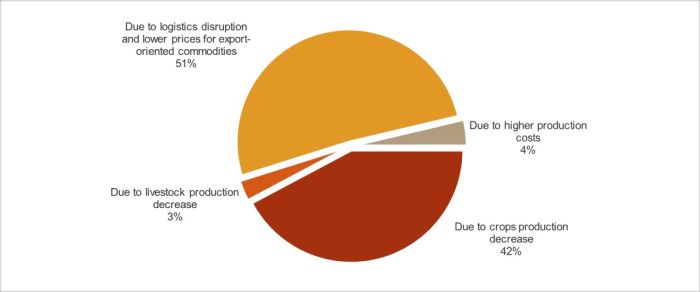agriculture,
losses
The indirect war losses in Ukraine's agriculture estimated at $23.3 billion – KSE Agrocenter

The indirect losses in agriculture due to production decrease, logistics disruption and lower prices for export-oriented commodities are estimated at $ 23.3 billion. USA. It is stated in the analysis «Agricultural War Losses Review Ukraine. Rapid Loss Assessment"**, prepared by the team of the Center for Food Research and Land Use at KSE Institute (KSE Agrocenter) in cooperation with the Ministry of Agrarian Policy and Food of Ukraine.
According to the previous report of the KSE Agrocenter, after three months of Russia’s full-scale war against Ukraine, the damage toll to Ukraine’s agriculture reached $ 4.3 billion, or nearly 15% of its capital stock. While damages reflect the destruction of tangible assets and inventories, the losses estimate the foregone revenue due to lower quantities of goods produced and additional costs the producers bear because of the war. The foregone revenue is the difference between the actual revenues and the revenues that could have been realized had there been no Russia’s invasion of Ukraine.
«Estimating losses is essential not only for understanding the magnitude of the downfall in the sector but for assessing the recovery needs as well. A substantial share of the foregone revenue was needed to cover the cost of the sowing campaign for crop producers or feed for livestock. Without a partial compensation for losses, farmers in the regions that suffered from the war would be unable to restart their production,» said Roman Neyter, an expert at the KSE Institute's Center for Food and Land Use Research.
LOSSES STRUCTURE BY CATEGORY

Indirect crop Losses due to lower output are $ 9.6 billion. The most significant drop in the estimated 2022 harvest is for wheat (expected 33% fall in the 2022 harvest, compared to the baseline), sunflower (32% fall), and barley (31% fall) since a substantial share of these crops is produced in the areas directly affected by the war. Compared to the previous year, a relatively less pronounced decrease in the 2022 harvest is expected for corn, i.e., 18% fall.
According to our estimates, the harvest for other annual crops in the 2022 calendar year is expected to be 22% lower compared to the 2021's harvest, resulting in another $ 3.3 billion of losses.
Livestock losses are different from crop production, where we estimate the monetary value of losses for only one year of lower harvest. While you can replant and get a new harvest from annual crops within a year — a fall in the livestock leads to lower production for multiple years since recovering the livestock production will take longer. The total losses for the livestock sector are estimated at $ 682 million.
Perennial crop losses due to a lower output cost $ 89 millions. An estimated average time needed for replanted gardens to start bearing fruits is five years. Thus, the losses caused by five years of lower perennial output are estimated at $ 222.4 million.
One of the Russian invasion consequences is a decrease in the farm-gate prices for export-oriented commodities. Because of the port blockade and the limited opportunities to export through other modes of transport, Ukraine suffers from a domestic supply shock. It leads to a corresponding nearly 30% domestic price decrease. The combined value of losses for top-four export-oriented crops (wheat, corn, barley, sunflower) is 11.9 billion US dollars.
CROP LOSSES DUE TO LOGISTICS DISRUPTION
Supply disruptions also led to an increase in agricultural input prices, in particular for the key ones — fertilizers and fuel. Fertilizer costs have increased by 37% since the Russian invasion. The estimated 39 cents per liter of diesel increase in the fuel prices induced additional losses for Ukrainian agricultural producers. Losses due to higher production cost $ 859 million.
The full version of Agricultural War Losses Review Ukraine (.pdf, 1.61 Mb). Rapid Loss Assessment.
**The rapid agricultural losses assessment was conducted in accordance with the World Bank and FAO methodologies[1]. Similarly to the agricultural war damage assessment, we estimated the losses using the indirect method. We started with establishing a baseline scenario — what would the production be without the war. We used the production levels in the calendar year 2021 to set a baseline scenario — the production volume without any disruption caused by the Russian invasion. We then applied area-specific losses coefficients based on the supposed severity of the fall in production.
